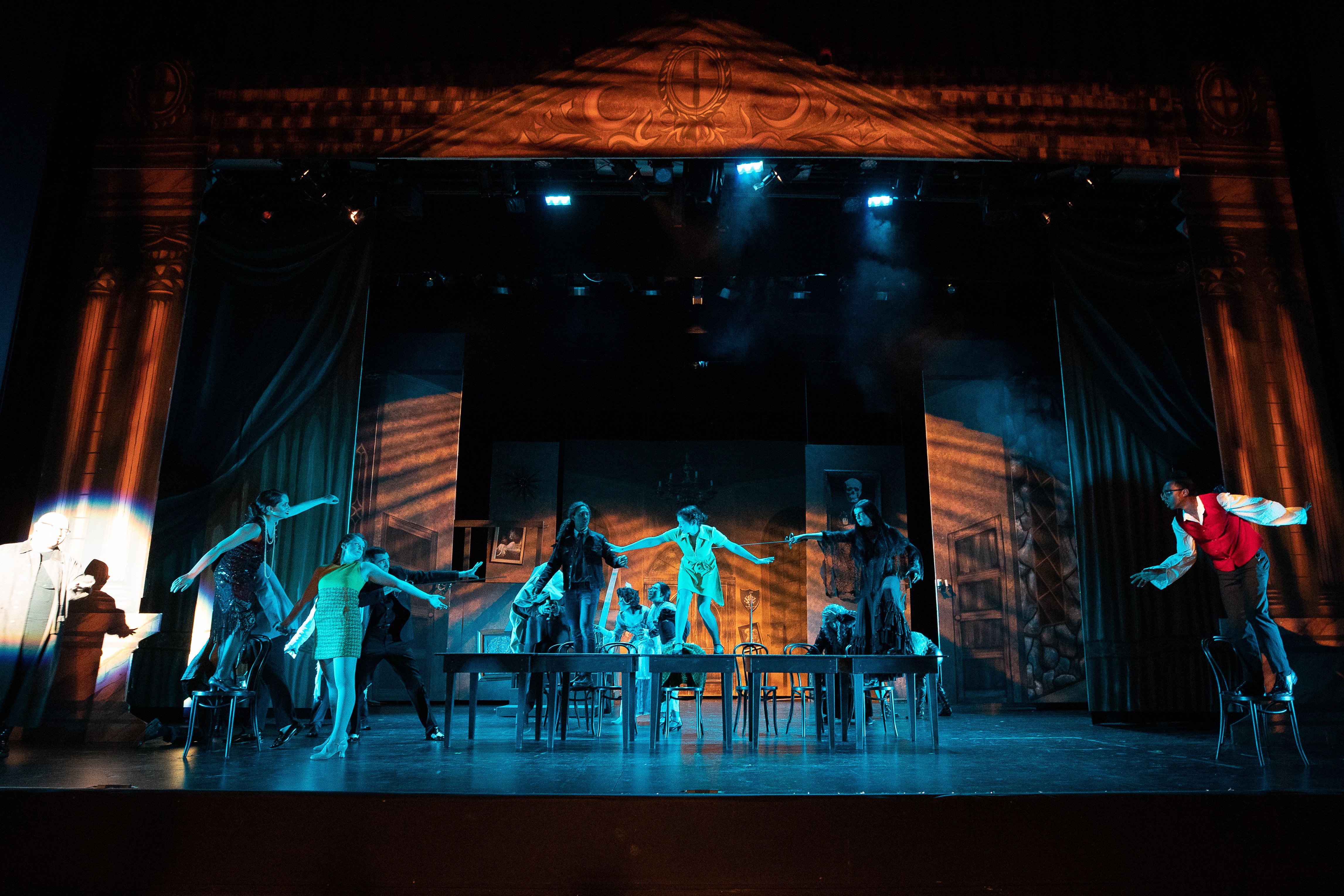Most theatrical performances begin with a short, functional reminder to silence your cellphones and abstain from recording. It’s not really a part of the show itself — it’s a courtesy notice, the kind of thing you throw in more because it’d be bad if you didn’t rather than any positive force toward it. Ram’s Head Theatrical Society’s production of “The Addams Family,” which runs this weekend and next in Memorial Auditorium, performs this reminder in full character, complete with multiple bits of prop comedy. It is extraordinarily extra, and therefore entirely fitting for the production. Ram’s Head’s “Addams Family” is a deeply cheesy, over-the-top show, and it’s at its best when it fully commits to that energy.
From the show’s opening number onwards, which deftly weaves in the classic theme of the 1960s television adaptation of Charles Addams’ original cartoons, “The Addams Family” reveals itself as a deeply campy production. For those unfamiliar with the term, camp refers to a certain style or artistic lens — one that emphasizes artifice, outlandishness and extravagance. For example, a musical that starts with a crew of the undead dancing the twist, as occurs in the first few minutes of “The Addams Family,” could be considered campy.
Now, a lot of the outlandish energy of “The Addams Family” comes from the original production, which premiered in 2009. The musical’s music and lyrics are by Andrew Lippa, whose work Ram’s Head previously performed two years ago with their production of his “The Wild Party.” In that production, which received criticism for its treatment of abuse, Ram’s Head had to grapple with a musical that shifted wildly between gaudy jazz-age tropes and serious depictions of sexual violence. Here, though, they have an easier job — “The Addams Family” is a comparatively straightforward romantic comedy. Yet, they fully and seriously commit to the ridiculousness of the premise and Lippa’s music, never flagging in the two hours of musical hijinks they provide.
For those unfamiliar with the broader mythos of “The Addams Family,” which has had a bizarrely long legacy in American pop culture since the 1930s debut of Charles Addams’ cartoons in the New Yorker, the concept is simple. The Addams — a family centered around the core unit of smooth, charming patriarch Gomez, sharply witchy matriarch Morticia, sadistic and emotionless daughter Wednesday and chaotic son Pugsley — are macabre as all hell in a world that is significantly less so.
Lippa’s musical plays around with that concept, setting it a decade or so after the original material and focusing on the romantic escapades that ensue when Wednesday Addams, here played with a perfectly struck dose of cynicism by Amanda Lim ’21, falls in love with Lucas Beineke (George Hosono ’22), a boy from an apparently normal family. The Addamses and the Beinekes meet for dinner, and from there, two hours worth of romantic conflict ensue, enveloping both Wednesday and Lucas and their respective parents. Of those three pairs, Gomez and Morticia (played, respectively, by Rio Padilla-Smith ’19 and Eve La Puma ’20) get the lion’s share of the plot. Padilla-Smith and La Puma commit fully to their roles, with Padilla-Smith’s Gomez seeming concocted of equal parts charm and flop-sweat and La Puma’s Morticia a compellingly chilling force of sarcasm. But even Temi Bolodeoku ’22 and Brooke Hale ’20, who play the Beineke parents, make the most of what could’ve been thankless roles as the third couple in an already overstuffed romantic comedy.
But remarkably, “The Addams Family” works best when it’s at its most overstuffed. In fact, the musical’s second act, where the action slows in a series of reconciliations, is the weaker of the two. That’s no discredit to it — it’s perfectly good theater. But the scene that exemplifies the mad-cap, goofy energy of “Addams” comes at the close of the first act, instead. In an extended number spilling out of a Addams family drinking game based on “Full Disclosure” of secrets, the entire plot of the musical gets turned inside out. Also, Vincent Nicandro ’20’s wonderful Fester Addams, the secret emotional core of the play, sings about being in love with the moon. It’s a chaotic scene, full of moving parts that a lesser production could have fumbled. Under Ram’s Head’s care, it went off without a hitch.
That’s likely due to the skilled direction of J.B. Horsley ’19 and the technical skill of staff members like choreographer Madeline Lee ’19 and music director Joshua Chang ’21. More than anything else, “The Addams Family” is a production where every part is finely honed to help achieve a totally over-the-top, goofy goal. It’s corny, but most of all, it commits.
Contact Jacob Kuppermann at jkupperm ‘at’ stanford.edu
